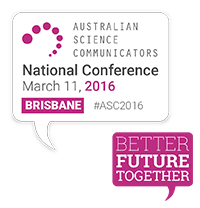Bob Bruce is a retired industrial engineer who has worked widely in government and private enterprise. He currently works as an IT Orange Card with Education Qld. He holds a double major in Psychology. He has been President of the Queensland Skeptics Association Inc since the turn of the century.
Bob was ‘the Skeptic’ on 4BC’s Paranormal Panel for over five years. His philosophy is based on the rules of science and believes that science should step beyond its advisory capacity and assume a more determinate role in decision making.
Bob has been involved with the Queensland Skeptics Association since the meetings took place in his lounge room. We spoke with Bob to find out more on why communicating science is important.
ASC: Why is communicating science important to you?
BB: Science plays a significant role in determining our future. The world must become scientifically literate or we will perish.
The older and uglier one gets the more one can look dispassionately at the world and determine what went wrong. The conclusion one draws is that the ideal pursuit for humanity is the discovery of ‘reality’ because we appear to have been pursuing something else.
Humans have clouded their judgment with all manner of cultural and traditional artefacts that, given our limited knowledge at the time, helped us adapt and survive our environment. But humans also have self-interest and avarice to deal with and foibles like ‘morality’ that tries to make sense of lots of humans acting together.
We have innumerable codes of ethics some based on logic or health and some based simply on the propagation of the species. Polygamy for instance served to ensure that sufficient numbers of newborns reach maturity to maintain the population but close family partnerships were frowned upon because undesirable genetic traits were expressed. We also wrongly assumed that the gods were in charge of the weather and the success or failure of the crops.
We only understand these things now because of science. Science shows us the real world without our biases and prejudices.
Humans relied on intuitive thinking which was often wrong. The taxonomy of the various species was originally done by intuition and was blatantly wrong in many cases. Plants that looked alike (because local environmental conditions shaped them) were unrelated and similarly animals were assumed to have quite erroneous family lineages. There is no taxonomic reason for ‘fish’ for instance. The discovery of DNA and genomics corrected the family tree. It also showed how homo sapiens spread across the world.
ASC: What challenges have you faced in talking about science?
BB: Getting people to understand the perilous state of the Earth is a big challenge.
If you make a statement like “commercial fishing in the Atlantic Ocean has collapsed”, people won’t believe you. Yet, the pH of the sea has fallen 0.1 in 25 years and the sea is destined to become an acid soup. Plankton which produces 50% of the oxygen we breathe is at the very base of the food chain and has declined by 80% in some areas around the Antarctic.
Our biases are embedded in our culture, prejudice and wishful thinking. We cannot be sure of the objectivity of an experiment unless it is triple blind.
Ultimately science and skepticism are seen as downers even though virtually all of the world’s progress is thanks to scientific research.
Information can be very touchy. Science is engaged in a ‘Hearts and Minds’ battle over fluoridation, vaccinations, GMOs and similar issues.
A massive market exists for supplements and health tonics that do very little. This can be regarded as a mild amusement but ultimately it is a sham and a waste of money. As an example public disinterest and the insidious thread of unknowing anti science, look at “Super Foods”. This food movement is media savvy, sensational and often wrong. There are no “Super Foods” and no additional nutritional benefits to organic foods.
As an example, consider the selection of bread…
On one hand we have supermarket bread – a plastic wrapped Supermarket loaf pre sliced, with bread improver, iodised salt, added folates, vitamin C, amino acids, preservatives, anti-oxidants, added flavours and colouring probably leavened with CO2 gas and formulated to stay soft for a week. The dough may be pre-prepared in Holland and shipped frozen to Australia before baking is completed locally.
On the other, we have “Holistic Earth Bread”: It is a crusty high top loaf made from 1000yo variety stoneground wholemeal spelt flour with no preservatives, no artificial colours, emulsifiers or bread improvers. It is low salt.
Consumers tend to prefer the crusty high top as somehow more wholesome, pure and healthy (and more expensive). However, the supermarket bread (which can be, admittedly, pretty basic) is formulated to be healthier; the added vitamins, folates and iodised salt are vital for pregnant mothers and avert birth defects in newborns. The preservatives avoid moulds and fungus that can be poisonous and contrary to popular belief they do not ‘preserve’ your insides (if only). The bread improvers improve texture and shelf life.
To sum up; the challenge of science is to make knowledge accessible, believable and credible (ABC) to the populace.
Interested in hearing more from Bob? He forms part of our ‘How can we understand and respond to people’s rejection of science?’ panel at the ASC Conference 2016.

